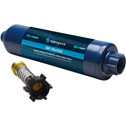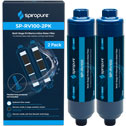RV Water Filter Guide: Choosing the Best Inline Water Filter
 Andrew
April 01, 2025
#camperwaterfilter
#descaler
#filterreplacement
#rvinlinefilter
#rvwaterfilter
Andrew
April 01, 2025
#camperwaterfilter
#descaler
#filterreplacement
#rvinlinefilter
#rvwaterfilter

When you invest in an RV or boat, you're investing in a lifestyle. Protecting that investment starts with understanding what's flowing through your pipes. The best RV water filters serve two crucial purposes: improving water quality for drinking, cooking, and showering, while simultaneously protecting your rig's internal systems from damage.
What is an RV Filter?
An RV water filter is a specialized filtration device designed to reduce impurities in water sources you connect to while traveling. Unlike standard home filters, these units are compact, portable, and specifically engineered to address the unique challenges RVers face with varying water sources. These filters typically last one camping season before requiring replacement, though this varies based on water quality, filter type, and usage frequency.
Types of RV Filters
RV water filtration solutions fall along a spectrum based on their intended use, capabilities, and price points.
The most common type is the RV inline water filter, which connects directly to your water hose. These filters typically attach either at the water source or at the point where water enters your RV. Basic inline filters use carbon filtration to improve taste and odor, while more advanced models employ multi-stage filtration systems that target sediment, chemicals, and scale issues from hard water sources.
It's important to understand that standard inline filters, while effective for improving taste and reducing many common contaminants, have limitations. Most importantly, they should only be used with biologically safe (potable) water sources. Although some filters with fine 1-micron ratings might technically trap certain microorganisms due to their size, standard inline filters aren't designed to disinfect water or kill bacteria and viruses. In fact, bacteria can sometimes collect and multiply inside filters not specifically designed for microbiological treatment.
For serious backcountry RVers who frequently encounter questionable water sources, more advanced RV water systems exist. These comprehensive water purification systems combine multiple stages of technologies like ultrafiltration, reverse osmosis, or UV sterilization to address microbiological contaminants, including bacteria, cysts, and even viruses. These systems provide the highest level of protection but come with significant trade-offs: much higher upfront costs, regular maintenance requirements, slower flow rates, and more complex installation.
For the vast majority of RV enthusiasts who connect to established campgrounds, RV parks, and municipal water sources, inline filters provide a cost-effective solution that addresses their most common issues—poor taste, odors, chlorine, sediment, and mineral buildup. These filters significantly improve water quality for everyday use while protecting RV systems from damage, without the complexity and expense of purification systems designed for untreated water sources.
Benefits Beyond Drinking Water
While many RVers initially consider water filters just for drinking water, their benefits extend much further:
- Better-tasting coffee and meals with clean, chlorine-free water
- More enjoyable showers without chlorine odor
- Reduced soap scum and water spots on dishes and fixtures
- Protection for appliances like water heaters and ice makers
- Extended life of plumbing fixtures and pipes
- Prevention of scale buildup in water systems
- Removal of sediment that can clog faucets and shower heads

With countless options available—from basic models at big box stores to specialized RV water filters online—choosing the right RV water filter can feel overwhelming. Understanding the key features that separate basic filters from premium protection will help you make an informed decision.
Multi-Stage Filtration Technology
The most useful RV water filters employ a multi-stage approach to water treatment. A typical high-quality system combines several filtration methods, each addressing specific water quality concerns. Many premium filters start with sediment filtration using polypropylene or melt-blown media to capture particle matter, protecting your carbon filter and preventing dirt and rust from reaching your RV's plumbing. This is usually followed by carbon filtration—with coconut shell carbon often preferred for its superior absorption capabilities—which tackles chlorine, odors, and many chemical contaminants. The better carbon media, particularly specialized catalytic carbon, can handle chloramines more effectively than standard carbon.
Some multi-stage systems include additional specialized filtration. For instance, you might find options with KDF (kinetic degradation fluxion) media for enhanced heavy metal reduction, or ceramic filters for finer particle removal. The more comprehensive filters include a third stage with descaling technology, which prevents mineral scale buildup in pipes and appliances. This protection, missing from many basic filters, can significantly extend the life of your RV's water system by transforming dissolved minerals into harmless micro-crystals that won't adhere to surfaces. When comparing systems, look for those that offer this comprehensive protection rather than just addressing taste and odor issues.

Practical Design Features
Beyond filtration technology, practical design elements make a significant difference in real-world usage:
- Flexible hose protectors: Prevent kinking at connection points, extending the life of both your filter and hose
- Dual installation options: Includes options for both campsite source and RV intake installation
- Manageable flow rate: Balances thorough filtration with practical water pressure (typically 0.5-2.5 GPM) for everyday use
- Standard hose connections: Compatible with standard garden hose fittings found at most campgrounds
Maintenance and Longevity
Most RV inline water filters are designed to last for one camping season with average use, though real-world performance varies considerably. Water quality plays a major role—highly chlorinated water or water with high sediment levels will exhaust filter media more quickly. Usage patterns matter too. Just a few long weekend outings might stretch a filter across multiple seasons, but full-timers rapidly checking off campsites near bucket/life list destinations may need replacement more frequently. Pay attention to storage instructions for between-trip maintenance: filters should dry completely after usage and be stored in a refrigerator if it'll be a while before the next trip. This maintenance can prevent mold and bacterial growth between use, though filters with quality carbon media also reduce the chances of this occurring.
When comparing options for RV water filter systems, price often becomes a deciding factor. While budget-friendly options exist, they typically provide only basic carbon filtration, missing the critical protection your rig's systems need.
The True Cost of Water Quality Issues
Consider the potential expenses associated with poor water quality in your RV:
- Water heater replacement: $500–$1,000
- New faucet and fixtures: $150–$300 each
- Plumbing repairs from scale buildup: $500
- RV water pump fail: $100–$400
A premium RV inline water filter represents a small investment compared to these potential repairs. More importantly, it ensures consistent water quality throughout your travels, enhancing your overall RV experience.
What Makes a Premium RV Filter Worth the Investment
When evaluating premium RV filter options, look beyond basic specifications to the quality of filtration media used. Solid options feature specialized components like German-made coconut shell catalytic carbon, which offers significantly better contaminant reduction than other carbon sources. This specialized carbon more effectively addresses chlorine, chloramines, and various organic contaminants that affect water taste and safety.
Perhaps most valuable is the inclusion of descaling technology in higher-end RV water filters for hard water. This specialized media doesn't just prevent new scale formation by transforming hard water minerals into harmless non-soluble microcrystals—it can actually help reduce existing scale deposits throughout your RV's water system. This comprehensive approach protects your entire investment while delivering noticeably better water quality. Though the initial cost may be greater than more basic sediment-carbon filters, the extended protection for expensive RV components and improved performance deliver substantially greater value over time.

Maximizing Your RV Water Filter's Performance
To get the most from your RV water filter, follow these practical tips:
- Install a pressure regulator before your filter to protect against high-pressure water sources that can damage both the filter and your RV's plumbing.
- Replace filters according to schedule, typically once per season for most RVers. Heavy users may need more frequent replacement.
- Monitor flow rate changes, which often indicate it's time for a filter replacement before the scheduled date.
- Store properly between trips by draining completely and allowing it to dry. For extended storage, keep in a refrigerator to prevent bacterial growth.
- Consider your installation location. Installing at the RV entry point rather than the water source can eliminate "hose taste" from your water.
- Flush new filters thoroughly before first use according to manufacturer instructions to remove any carbon fines.
Summary
Hitting the great outdoors is an adventure—but the water you bring along should always be clean, clear, and safe. A quality RV inline water filter can help make sure that every glass you pour, every shower you take, and every appliance in your RV receives the best possible water.





